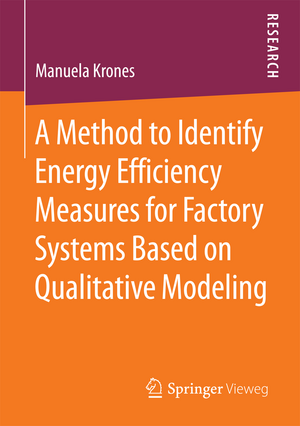A Method to Identify Energy Efficiency Measures for Factory Systems Based on Qualitative Modeling
Autor Manuela Kronesen Limba Engleză Paperback – 22 mai 2017
Preț: 523.72 lei
Preț vechi: 616.14 lei
-15% Nou
Puncte Express: 786
Preț estimativ în valută:
100.21€ • 104.63$ • 82.94£
100.21€ • 104.63$ • 82.94£
Carte tipărită la comandă
Livrare economică 04-18 aprilie
Preluare comenzi: 021 569.72.76
Specificații
ISBN-13: 9783658183424
ISBN-10: 365818342X
Pagini: 234
Ilustrații: XXII, 234 p. 43 illus.
Dimensiuni: 148 x 210 x 14 mm
Greutate: 0.31 kg
Ediția:1st ed. 2017
Editura: Springer Fachmedien Wiesbaden
Colecția Springer Vieweg
Locul publicării:Wiesbaden, Germany
ISBN-10: 365818342X
Pagini: 234
Ilustrații: XXII, 234 p. 43 illus.
Dimensiuni: 148 x 210 x 14 mm
Greutate: 0.31 kg
Ediția:1st ed. 2017
Editura: Springer Fachmedien Wiesbaden
Colecția Springer Vieweg
Locul publicării:Wiesbaden, Germany
Cuprins
Driving Concerns for and Barriers against Energy Efficiency.- Approaches to Increase Energy Efficiency in Factories.- Socio-Technical Description of Factory Planning Tasks.- Description of Energy Efficiency Measures.- Case Studies on Welding Processes and Logistics Systems.
Notă biografică
Dr. Manuela Krones works as a research assistant at the Department of Factory Planning and Factory Management at Chemnitz University of Technology, Germany, and has conducted several projects on the energy efficiency of production and logistics systems.
Textul de pe ultima copertă
Manuela Krones develops a method that supports factory planners in generating energy-efficient planning solutions. The method provides qualitative description concepts for factory planning tasks and energy efficiency knowledge as well as an algorithm-based linkage between these measures and the respective planning tasks. Its application is guided by a procedure model which allows a general applicability in the manufacturing sector. The results contain energy efficiency measures that are suitable for a specific planning task and reveal the roles of various actors for the measures’ implementation.
Contents
- Driving Concerns for and Barriers against Energy Efficiency
- Approaches to Increase Energy Efficiency in Factories
- Socio-Technical Description of Factory Planning Tasks
- Description of Energy Efficiency Measures
- Case Studies on Welding Processes and Logistics Systems
Target Groups
- Lecturers and Students of Industrial Engineering, Production Engineering, Environmental Engineering, Mechanical Engineering
- Practitioners in Factory Planning, Production Engineering, Energy Management
The Author
Dr. Manuela Krones works as a research assistant at the Department of Factory Planning and Factory Management at Chemnitz University of Technology, Germany, and has conducted several projects on the energy efficiency of production and logistics systems.
Caracteristici
A method to generate energy-efficient planning solutions Includes supplementary material: sn.pub/extras
